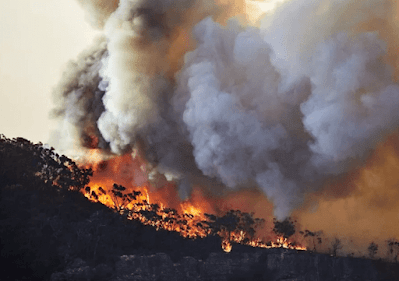The pace of global warming might be slowed by thirty percent, according to estimates provided by experts, if we took immediate action to cut the pollution caused by methane emissions.
Within a span of just more than a month, France will have been hit by not one, not two, but three heat waves. During the heat wave that occurred in July, multiple heat records were broken around the nation, and temperatures came close to or even beyond 40 degrees Celsius. This oppressive heat has resulted in a number of forest fires, the most notable of which have been responsible for the loss of thousands of hectares in the Gironde. Since then, there have been a great number of other forest fires.
The last set of tangible repercussions brought on by climate change are these. The scientists had issued a warning. It is possible that we may come to the conclusion that it is too late to take action because of the terrible weather conditions that are occurring simultaneously over the world. But the fact of the matter is that we still have the chance – and the duty – to make a significant impact in the here and now.
Methane is a potent greenhouse gas with a warming potential that is more than 80 times larger than that of carbon dioxide when measured over a period of 20 years. This opportunity lies in methane. More than a quarter of the warming that is happening right now is due to the emission of methane, which comes from oil and gas operations, agriculture, and other businesses. There is an issue with this multiplier effect. However, it is also a solution that is simply waiting to be put into action.
Scientists estimate that we could slow the rate of warming by thirty percent if we reduced pollution caused by man-made methane as quickly as possible. This would be a significant difference at a time when governments are scrambling to find a way to keep warming below the dangerous threshold of two degrees Celsius (if not the threshold of 1.5 degrees Celsius targeted by the Paris climate agreement).
The good news is that leaders all across the globe have started to take action, which indicates that they have recognized both the urgency and the potential. The climate change talks that took place in Glasgow in the fall of last year were quite productive. A few days previously, over one hundred nations reached an agreement to restrict their cumulative emissions of methane by at least thirty percent by the year 2030 by signing the Global Methane Commitment, which was spearheaded by the European Union and the United States. Over the course of so many years, we have seen that climate change rhetoric does not necessarily convert into action. However, there has been significant development in the field of methane.
An important step has been taken, and that is the presentation of new European law on methane emissions in the energy industry by the European Commission. The European Parliament and the member states of the European Union are now in the process of negotiating the proposal. The European Union (EU) will be the first and biggest area to take actual action to limit methane emissions once an agreement has been reached.
Some people are concerned that rising energy costs and geopolitical unrest would slow down progress on climate change because it will make it more difficult to secure energy security, which will cause the energy transition to take a back seat. In the case of methane, addressing climate change and ensuring energy security go hand in hand.
Methane, usually referred to as natural gas, is the component that powers the majority of our lights and keeps our houses at a comfortable temperature. However, oil and gas producers throughout the globe, including in the European Union, are inadvertently releasing methane via leaks, purposeful releases, or - what's even worse – by burning it in a technique known as flaring, which is an inefficient way of disposing of trash. All of this while polluting our air and contributing to the warming of our environment.
The European Commission (EC) initiated REPowerEU as a preventative measure to forestall more severe disruptions in the supply of electricity brought on by the conflict in Ukraine. This seeks to reduce energy consumption, increase production of renewable energy, and diversify the sources of energy supply in the EU.
Natural gas has a significant position in Europe's energy mix, despite the fact that the EU imports almost all of its gas requirements. If European governments continue to overlook the emissions that are involved with the production of methane, environmentalists have every reason to be concerned about the methane footprint of new gas sources.
To reduce methane emissions within the EU, the legislation on methane in the energy sector of the EU, as it is currently proposed, offers important technical measures to reduce emissions, but it does little or nothing to combat emissions that are imported. In order for Europe to continue to meet the climate commitments it has made, this situation needs to change.
And the opportunities are there: if European nations may now incorporate methane criteria in new gas supply contracts, then the European Parliament and the Council of the European Union can write and enact significant methane legislation in the long term.
In conclusion, one of the quickest, simplest, and most cost-effective ways to rapidly decrease the pace of climate change is to reduce the amount of methane emissions that are produced by the oil and gas sector. It also turns out to be one of the fastest and most cost-effective strategies to stabilize energy markets in the face of turbulence caused by geopolitical conflict. The European Union cannot allow itself to pass up this opportunity because it is a "win-win" situation.

